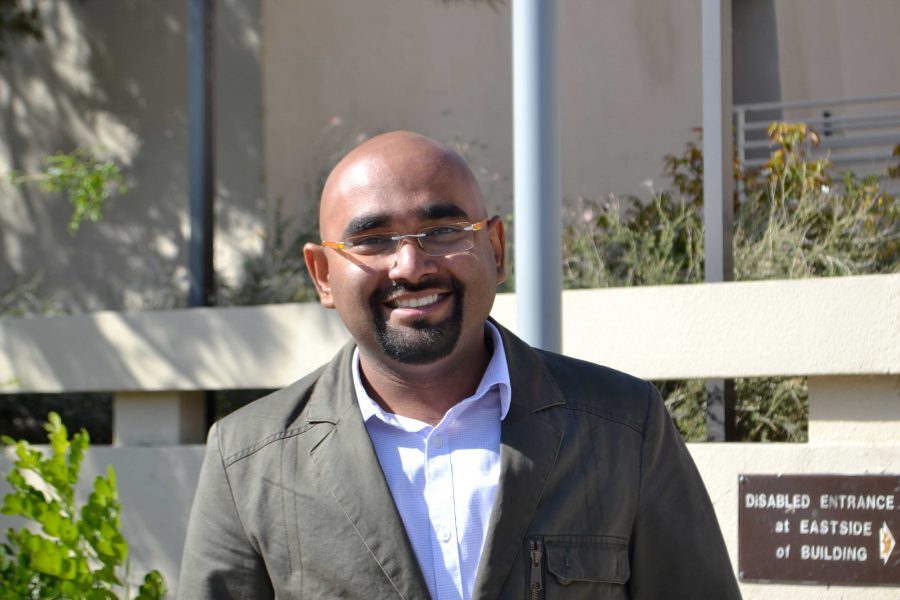Born and raised in Mumbai, India, Nakul Karle is a graduate student in computer science who came to UTEP in February 2015 to start his doctoral research.
The city of Mumbai is the capital of Maharashtra state in India. It is the fourth-most populous city in the world with more than 22 million people.
“I could barely see people around me. Unlike there (Mumbai), where you could walk 10 feet and you would find someone,” Karle said.
It took Karle nearly a year and a half to get used to the cultural differences between India and the U.S.
“There’s bunch of Indian students here so that made my life a little comfortable at the beginning because I was completely new here. Fortunately, my advisor also is Indian, again some comfort there,” Karle said. “Then I started making friends and Mexicans were the first. Now I have so many friends around campus, starting with Mexicans, Arabs, some Europeans and even Asians.”
There are more than 150 languages in India. The official language is Hindi, but because India was colonized by the British, English remained as the language for the administration and education.
Karle also said the train system in Mumbai was his way of traveling from home to school. These journeys would last from three to four hours every day.
“Trains in Mumbai are like the lifeline of the city. I guess like seven million people travel by train every day. It is so difficult to get into the train, literally, you would see people hanging at the door,” Karle said. “However, that struggle is something unique because once you get used to that struggle, I think you can survive anywhere in the world.”
Karle now laughs at the students who complain about the “crowded” shuttle buses.
Friendships in India is another thing Karle recalls fondly. In Mumbai, lunchboxes are shared between 15 to 20 people at recess and your friends become a part of your family.
“When I used to carry my lunchbox, my mom would be like ‘oh but your friend likes this so I’m adding this to your lunchbox,’” Karle said. “Everyone would open their lunchboxes and everyone would be eating. The moment you open your lunchbox there is someone else and you are in someone else’s lunchbox.”
Education in India is also different, according to Karle. Karle said education is a lot cheaper compared to the U.S. He estimated that a bachelor’s degree is about 3,000 rupees maximum, or $50.
Karle also thinks education is more rigorous in India since you have only one final exam each year beginning in elementary school. These tests often include 15 to 20 chapters for each subject and six subjects in total.
Students are graded on a percentage scale from 0 to 100, and the passing grade is 50. Karle said that at finals, the only thing a student from Mumbai would care is to pass “that golden number.”
“Students here (U.S.) at the undergraduate level are learning something which we learned back in our 10th grade or something,” Karle said. “In India, students complain that it is too rigorous, but after coming here you realize the system is pretty good because you are up for the challenge.”
Karle said classrooms in Mumbai often have 70 to 80 students, and seven students have to take turns to use one computer.
“You go to the science lab here and you see a student working with one instrument—one student and one instrument. But that’s not possible there (Mumbai) because you don’t have that many instruments to provide to students,” Karle said. “So you would see like five or six students working on one experiment.”
Books are “super cheap” in India according to Karle, and the government wants students to study.
“In dollars, a particular book is like $60 here and the same book would be like $10 or even less in India, it is that big a difference,” Karle said. “I wouldn’t say the quality of the books would be super nice as what you have here, but who cares because you want to just study for the class.”
Karle feels that life is very simple and easy in the United States, and people in the U.S. do not appreciate the privileges and resources given to them.
“They should go to India and see how the life is there and they will start appreciating it here,” Karle said.






Dattaram Sawant • Dec 7, 2016 at 3:46 AM
Very Nice Speech,
Specially…
“Friendships in India is another thing Karle recalls fondly. In Mumbai, lunchboxes are shared between 15 to 20 people at recess and your friends become a part of your family.”
Miss You Bro..